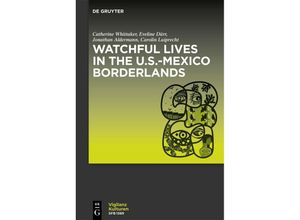Watchfulness shapes many Chicanxs' and other People of Color's everyday lives in San Diego.
Experiencing racist discrimination can lead to becoming vigilant which frames their
subjectivity. Focusing particularly on Chicanxs we show how they seek to intervene against
structural inequalities and threats in their lives such as by re-claiming space consciousness
raising participating in protests and healing practices. We argue that contestations
surrounding belonging create particularly watchful selves and that this is a significant aspect
of borderland lifeworlds more broadly. The book advances the Anthropology of borders
coloniality subjectivity and race as well as contributing to Chicano and Latino Studies and
Urban Studies. Pushing the boundaries of conventional approaches this book is methodologically
innovative by including team fieldwork digital ethnography and illustrative work by a local
artist. It fills a gap in Security Studies by examining peer-to-peer vigilance beyond top-down
surveillance and bottom-up sousveillance and expanding previous understandings of watchfulness
as an ambivalent practice that can also express care and contribute to community building as
well as representing a way of life.



